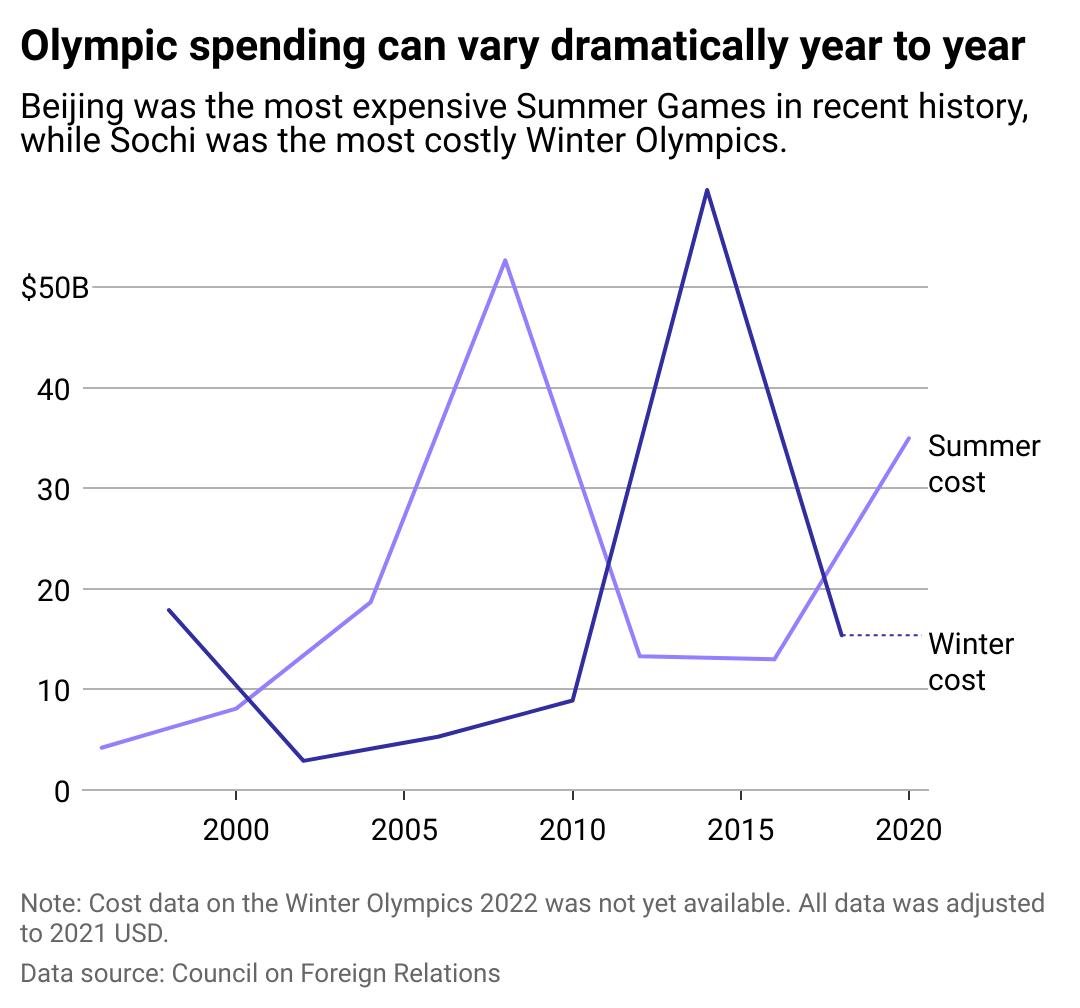Scott Halleran // Getty Images The Olympics is the biggest sporting event in the world. OLBG consulted an analysis from the Council on Foreign Relations to determine which countries have hosted some of the most expensive Olympic Games in history. When the first modern Olympic Games began in 1896, many countries–both emerging and wealthy–could publicly afford the event. However, over the decades, flashy host city proposals and higher athlete participation have led to ballooning costs of the Games. It has now come to a point where only wealthy countries can incur that expensive of an event. Even still, many countries carry large amounts of debt years after the Games are over. Notably, Montréal’s taxpayers continued to pay the debt from its 1976 Summer Olympics three decades after the last of the athletes left town. It’s estimated that the cost of hosting the Olympic Games from 1896 to 2016 increased 200,000%, according to Time magazine. Still, only 251 athletes competed in 1896 compared to over 11,000 in Tokyo. Though there is no denying that hosting the Olympic Games can catapult a city’s fame and reputation, the costs are increasingly onerous, and residents are pushing back more and more, so much so that, in 2017, the International Olympic Committee awarded the 2028 Summer Games to Los Angeles without calling for other bidders–a telltale move of the Games’ diminishing allure. In comparison, 11 cities submitted their applications to host the 2004 Olympic Games and 10 cities bid for 2008’s edition, while 9 cities did so for 2012. Meanwhile, five potential host cities for the 2022 Winter Olympics withdrew their bids after voter referendums or polling showed a lack of support, according to the Georgetown Journal of International Affairs. So which cities gave it their all (including most of their budgets) for the chance at Olympic glory? #10. 2000 Sydney Summer Games Philippe Caron // Getty Images Cost (in 2021 dollars): $8.1 billion The 2000 Sydney Olympics occurred in the last decade of the 20th century while the world grappled with globalization. As host to the prestigious Games, the city was able to frame itself as an up-and-coming location able to keep up with rapid change, but the results have been mixed. Sydney used the Olympic Games to center renewal environmental efforts rather than the traditional industrialization and pollution that had become synonymous with the Games. One of its most visible efforts included cleaning Homebush Bay, a waste dump, and turning it into the Sydney Olympic Park. It also led to the country’s first urban water recycling system on a wide scale, estimated to save 850 million liters of drinking water annually. On the other hand, a 2007 modeling effort found that household and government consumption declined $2.1 billion between 1997 and 2005 due to the city’s participation in the Games. #9. 2010 Vancouver Winter Games Kevork Djansezian // Getty Images Cost (in 2021 dollars): $8.9 billion In 2003, voters in Vancouver voted to accept their 2010 Winter Olympics bid if they were awarded it. A few months later, that became a reality with Vancouver, Canada, beating out Pyeongchang, South Korea, and Salzburg, Austria. As the Games approached, concern over the weather hovered. While Vancouver in February was known as a winter wonderland, in 2010, it averaged 50 degrees. Organizers around the clock brought in truckloads of snow to cover the competition slopes. Despite the obvious difficulties of hosting and natural challenges to overcome, Vancouver ended the Games debt-free, which is still a rarity. The Olympics boosted British Columbia’s gross domestic product by $2.3 billion (British Columbia is the province where Vancouver sits). It also created 45,000 jobs and added $1.1 billion in private contracts for local businesses, Canada’s Ministry of Finance reports based on a PricewaterhouseCoopers study. All of the facilities used during the Games are still in use. Notably, the Richmond Speed Skating Oval–used for hockey, speed, and ice skating competitions–is a community fixture that receives over half a million visitors annually. #8. 2016 Rio de Janeiro Summer Games Ramsey Cardy // Getty Images Cost (in 2021 dollars): $13 billion When Rio de Janeiro was awarded the 2016 Olympic Games in 2009, it was an opportunity to show the world Brazil’s growth and international influence. Luiz Inácio Lula da Silva, Brazil’s president at the time, sold the Games to the public to modernize Rio de Janeiro and provide economic and job growth to the city. While some jobs came, low-income families were displaced to build facilities and housing for the Games. According to a 2021 study, roughly 77,000 people were displaced from 2009 to 2016, which had a lasting impact on the city. The consequences of gentrification on Olympic host city communities have always been a hot-button issue. Still, after Rio de Janeiro, it sparked a debate on whether the Games are truly worth it, particularly to locals. #7. 2012 London Summer Games Steve Rose // Getty Images Cost (in 2021 dollars): $13.3 billion London’s theme for its 2012 Olympic bid was “a model for social inclusion.” Still, like Rio de Janeiro, Londoners were promised economic development and housing, particularly for low-income families, which never fully arrived. “It feels like a massive betrayal,” Paul Amuzie, a local east London resident, told The Guardian in 2022. Amuzie initially supported the Games’ presence because of what it meant for affordable housing in a part of London ravaged by crime and other neglect. During its Olympic development efforts, the city promised to build up to 40,000 affordable housing units around Olympic Park. However, 10 years later, according to The Guardian, less than half of those units were built. On the bright side, London’s Olympic Park continues to attract over 1 million visitors a year, and over 110,000 jobs were created, according to the IOC. #6. 2018 Pyeongchang Winter Games Daniel Karmann // Getty Images Cost (in 2021 dollars): $15.4 billion Like many Olympic hosts, the cost of the Pyeongchang Games became a flashpoint. South Korea’s debt is more than half the country’s economic size, inflaming fears similar to other Olympics that hosting the Games wouldn’t be worth it. The surge in cost was scrutinized, with particular attention to a new high-speed rail that connected travelers to Seoul in less than two hours and the Olympic stadium, which seated 35,000 spectators but was only used four times throughout the Games. Still, the Olympic bid introduced Pyeongchang, which The New York Times has characterized as a “mountain backwater that produced potatoes and cattle,” to the world and put a physicality to a location known just for being too close to the shared border with North Korea. #5. 1998 Nagano Winter Games Jamie Squire // Getty Images Cost (in 2021 dollars): $17.9 billion Like many Olympic host cities, the price tag began to exceed the initial budget leading up to the Nagano Winter Games. The local mayor at the time, Tasuku Tsukada, defended a 20% jump in the initial budget over criticism that excessive spending on venues wouldn’t be worth it because they would be abandoned after the Games. “There is no need for concern,” he told The Washington Post then. “The facilities will be put to sufficient use.” The Games gave Nagano an opportunity to upgrade its ski resorts and infrastructure, elevating the city as a key winter sports destination in the world. Notably, the extension of the bullet train decreased the travel time between Tokyo and Nagano from three hours to a mere 80 minutes. #4. 2004 Athens Summer Games

10 of the most expensive Olympic Games in history
Jun 27, 2024 | 2:30 PM




